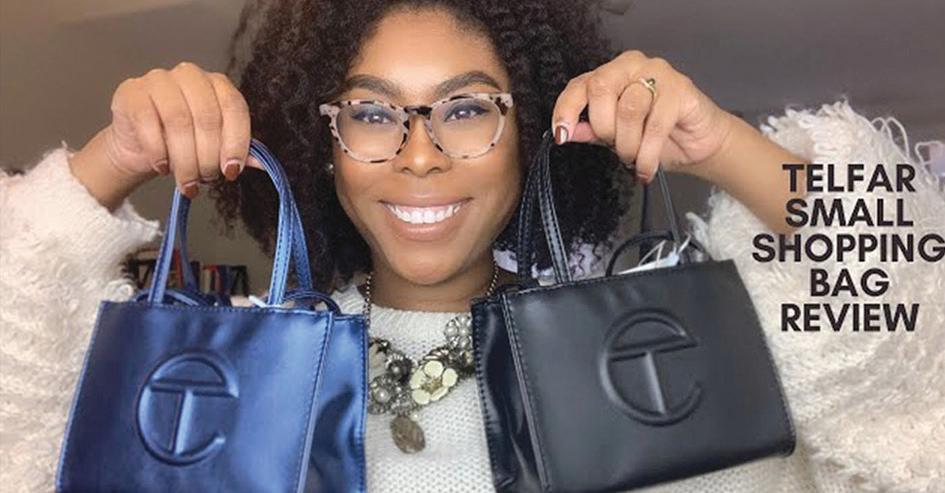

Retreat from CommitmentsDiversity
By Stacy M. Brown
The NAACP is urging Black Americans to direct their economic power toward companies that have maintained their commitments to diversity, equity, and inclusion as corporate America faces mounting conservative pressure. The civil rights organization has released a spending guide identifying businesses that have upheld or reversed their DEI promises, stressing the importance of economic leverage in fighting racial equity.
The initiative comes as Black consumers are projected to spend nearly $2 trillion by 2030, according to the McKinsey Institute for Black Economic Mobility. NAACP President Derrick Johnson said that corporations rejecting multiculturalism are putting themselves at a disadvantage in a changing economy.
“Diversity is better for the bottom line,” Johnson told the Associated Press. “In a global economy, those who reject the multicultural nature of consumerism and business will be left in the past they are living in.”
The National Newspaper Publishers Association (NNPA), representing the Black Press of America, has also launched a national public education and selective buying campaign in response to corporations abandoning their DEI commitments.
NNPA Chairman Emeritus Danny Bakewell Sr. said the moment calls for Black-owned media to take decisive action and hold businesses accountable for rolling back programs that support equity and inclusion.
NNPA Chairman Bobby R. Henry Sr. said the Black Press remains firm as a watchdog and will not be silent as corporate America shifts toward policies that threaten economic opportunities for Black communities. He said the rapid reversal of diversity commitments directly attacks progress, and the Black Press will continue to ensure that families and communities remain informed about these issues.
During a recent meeting of NNPA publishers and editors, members agreed to launch a public education campaign that will include research on corporations engaging in practices perpetuating economic and racial injustice. NNPA President and CEO Dr. Benjamin
F. Chavis Jr. said Black consumers have long fueled the economy and should rethink their spending habits when companies fail to show respect. He noted that Black Americans spend $2 trillion annually and must now evaluate why they continue to support businesses that do not value their contributions. Chavis added that it is time to challenge these contradictions, making it clear that 50 million Black Americans will not accept policies that erode the progress made in the fight for equality and inclusion.
Like the NNPA, the NAACP’s initiative includes a selective buying campaign targeting companies that have walked away from DEI commitments, with a significant focus on Target. Dr. Jamal Bryant, pastor of New Birth Missionary Baptist Church in Atlanta, has called for a 40-day economic fast against the retailer, urging 100,000 people to stop spending at Target in response to its recent decision to phase out DEI initiatives. Bryant said Target initially pledged $2 billion in investments to Black-owned businesses following the murder of George Floyd but canceled that commitment when it announced its retreat from DEI in January.
“Black people spend $12 million a day at Target,” Bryant said during an appearance on the Black Press’ Let It Be Known news program. “Because of how many dollars are spent there and the absence of commitment to our community, we are focusing on Target first.”
The campaign coincides with Lent and aims to use Black economic power to hold corporations accountable. Within one week, more than 50,000 people signed on to the effort at targetfast.org.
The NAACP clarified that its effort is not a boycott but an economic “buy-in” strategy, encouraging consumers to spend their money with companies that align with their values. Keisha Bross, a financial strategist at the NAACP, said the Black Consumer Advisory provides a clear picture of where businesses stand on DEI. The advisory names Delta Airlines, Apple, and Ben & Jerry’s as companies that have remained committed to diversity. McDonald’s, Meta, and Walmart are listed among those who have left past commitments.
The civil rights group said the rollback of DEI

initiatives directly threatens economic opportunities, workplace diversity, and community investments. The elimination of DEI roles, reductions in supplier diversity, and declines in community investments make it harder for Black professionals and entrepreneurs to compete.
The shift away from equitable hiring practices is further marginalizing people of color, and the group warned that corporations are using the concept of meritocracy to justify exclusion.
“We encourage you to spend your money where you’re respected, support Black-owned businesses, and demand businesses prioritize people over profit,” the NAACP said in a statement. “Above all, we must continue to advocate for policies that ensure people of color, women, veterans, those with a disability, and all protected groups have equal access to opportunities across the country.”
Another Push for Reparations for Slavery and a Black Wall Street
By April Ryan
The growing movement for reparations for the descendants of Africans enslaved in America is receiving another jolt of energy. Democratic Massachusetts Congresswoman Ayanna Presley is revitalizing the work of the late Texas Congresswoman Sheila Jackson Lee with the reintroduction of H. R. 40. The newly reintroduced bill would create a 15-member commission to study concrete solutions to the Black Wall Street Tulsa Massacre. Also, the new H.R. 40 bill would develop recommendations for reparations for slavery. Democratic New Jersey Senator Cory Booker is introducing a similar bill in the United States Senate. However, Pressley says the House bill already has 70 co-sponsors, and she will ask Republicans and Democrats to co-sponsor H.R. 40. However, there are no official Republican sponsors yet. The bill would also probe racist disparities that inhibited Black wealth. Marc Morial, the head of the National Urban League, says,” We must stay the course!” The head of the economic civil rights organization says the current wealth gap disparity between Blacks and whites is “10-1 at least. Maybe higher.” Pressley wants what she calls the “reparative work,” similar to what was offered to Native Americans and Japanese Americans. In 1988, Republican President Ronald Reagan apologized to the surviving Japanese

Americans for their incarceration during World War ll. 80,000 Japanese Americans received $20,000 each from the federal government as part of the apology. Reparations for Native Americans also occurred after World War ll. 1.3 Billion dollars was paid by the Indian Claims Commission as it provided $1000 per person.
Democratic Chicago congressman Joshua Jackson
pointed to Evanston, Illinois. That town currently offers reparations as the first municipal program in the United States to address racial discrimination and segregation. Black residents and their descendants who lived in Evanston between 1919 and 1969 are eligible for up to 25 thousand dollars to help with real estaterelated issues. From the press conference on Capitol Hill, Pressley encouraged President Donald Trump and the man she calls his “co-president,” Elon Musk to support H.R. 40. Congressional leaders attending and supporting the reintroduction of H.R. 40 were Congressman Johnathan Jackson, Congresswoman Summer Lee, Congresswoman Bonnie Watson Coleman, and the Chair of the Congressional Black Caucus, New York Democratic Congresswoman Yvette Clarke. Presley is the third Black congressional leader who carried on the legacy of a movement toward reparations. It began in 1969 with the late Michigan Congressman John Conyers and was reintroduced by Congresswoman Sheila Jackson Lee in recent years. Congresswoman Lee received 140 co-signers on the bill that Congresswoman Pressley and Senator Booker now champion. Texas Congresswoman Erica Lee Carter, the daughter of the late Congresswoman Sheila Jackson Lee, said, “This is not the past” but about the present and future.
Flu Cases Skyrocket Nationwide, Overwhelming Hospitals and Closing Schools
By Stacy M.

co-presented by the NAACP and BET, will take place Saturday at the Pasadena Civic Auditorium in California. Categories range from entertainer of the year to best movie to outstanding work of poetry.
Suspect in Tupac Shakur Killing Seeks to Delay Trial
LAS VEGAS (AP) — Attorneys for the man suspected of killing rap icon Tupac Shakur want to delay next month’s trial, saying more time is needed for investigative work to ensure that Duane “Keffe D” Davis gets a fair trial.
The motion filed Friday in a Nevada court provides insight into Davis’ defense, noting that a private investigator has identified witnesses who can testify that he was not at the scene of the 1996 shooting, nor was he in Las Vegas at the time. The motion also suggests that someone else may have orchestrated the shooting and that witnesses who could testify on the matter are being interviewed.
The defense team said in a statement that the new developments and the need to interview key witnesses necessitate a delay. A hearing was scheduled Tuesday to discuss the timing of the trial, currently set to begin in March.
“This case involves decades-old allegations, and with every new piece of evidence, it becomes increasingly clear that critical facts have yet to be fully examined,” said attorney Carl Arnold, who is leading Davis’ defense. On the night of Sept. 7, 1996, Shakur was in a BMW being driven by Death Row Records founder Marion “Suge” Knight. They were waiting at a red light when a white Cadillac pulled up next to them and gunfire erupted.
Davis, an ex-gang leader who is accused of orchestrating Shakur’s killing near the Las Vegas Strip, has pleaded not guilty to first-degree murder and has been jailed since his September 2023 arrest. Long known to investigators as one of four suspects identified early in the investigation, he is the only one to be charged.
Arnold has argued that Davis never should have been charged because of immunity agreements that Davis says he reached years ago with federal and local prosecutors while living in California.
Prosecutors have said any immunity agreement was limited and they have strong evidence against Davis, including his own accounts of the shooting in the tell-all memoir “Compton Street Legend.”
Davis has acknowledged in interviews and in the memoir that he provided the gun used in the drive-by shooting and that he was in the car. But his court filings say his descriptions in recent years of orchestrating the shooting were “done for entertainment purposes and to make money.”
Defense attorneys also say they have witness information indicating that Shakur was in stable condition after the shooting and that he died suddenly after being hospitalized for a week. They were consulting medical and forensic experts to evaluate potential alternative causes of death.
NAACP Sues Trump Administration Over Dismantling of Consumer Financial Protection Bureau
By Stacy M. Brown
NNPA Newswire Senior National Correspondent
The NAACP has filed a lawsuit in the U.S. District Court for the District of Columbia challenging the legality of the Trump administration’s decision to dismantle the Consumer Financial Protection Bureau (CFPB). The civil rights organization argues that the move undermines protections for Black, elderly, and vulnerable consumers, leaving them exposed to financial exploitation. NAACP President and CEO Derrick Johnson condemned the administration’s actions, calling them a reckless assault on consumer protections. “Once again, we are witnessing the dangerous impacts of an overreaching executive office. The Trump Administration’s decision to dismantle the Consumer Financial Protection Bureau opens the floodgates for unethical and predatory practices to run rampant,” Johnson stated. “We refuse to stand idly by as our most vulnerable communities are left unprotected due to irresponsible leaders. From seniors and retirees, disabled people, and victims of disaster to so many more, our nation stands to face immense financial hardship and adversity as a result of the elimination of the CFPB. If our President refuses to put people over profit, the NAACP will use every tool possible to put Americans first.”
The lawsuit comes after a series of drastic actions following the ouster of CFPB Director Rohit Chopra. President Trump replaced Chopra with Russell Vought, who immediately instructed staff not to perform any work tasks and ordered the closure of the agency’s headquarters, taking steps to cancel its lease. Vought also suspended all investigations, rulemaking, public communications, and enforcement actions. Keisha D. Bross, NAACP Director of Opportunity, Race, and Justice, said the organization maintains its commitment to restoring the bureau’s critical role in protecting consumers. “The CFPB is an agency of the people. From the protection from junk fees to fighting excessive overdraft fees, providing assistance to impacted victims of natural disasters, and holding predatory practices accountable, the NAACP stands firm in bringing back the CFPB,” Bross said. “The NAACP will fight to hold financial entities responsible for the years of inequitable practices from big banks and lenders.”
The lawsuit, filed alongside the National Treasury Employees Union (NTEU), the National Consumer Law Center, the Virginia Poverty Law Center, and the CFPB Employee Association, argues that the administration’s actions violate the Constitution and the Administrative Procedure Act. According to the complaint, the Trump administration has taken deliberate steps to dismantle the CFPB, including firing 70 employees via form email, canceling over $100 million in vendor contracts, and shutting down the agency’s consumer complaint system, which processes hundreds of thousands of cases monthly. The plaintiffs warn that these actions will leave millions of Americans defenseless against financial fraud and predatory lending practices. The lawsuit details the harm already inflicted by the agency’s closure. Among those affected is Rev. Eva Steege, an 83-year-old pastor with a terminal illness who was seeking student loan forgiveness through a CFPB-facilitated program. Her meeting with CFPB staff was abruptly canceled, leaving her without recourse to resolve her debt before passing. The NAACP and other plaintiffs seek an immediate injunction to halt the administration’s actions and restore the CFPB’s operations. The legal challenge argues that the President has no unilateral authority to dismantle an agency created by Congress and that Vought’s appointment as acting director is unlawful. President Trump has made no secret of his desire to eliminate the CFPB, confirming last week that his administration was working to “totally eliminate” the agency. Tech billionaire Elon Musk, a key player in Trump’s “Department of Government Efficiency,” celebrated the move with a social media post reading “CFPB RIP.” If successful, the lawsuit could force the administration to reinstate the agency and resume its enforcement actions against financial institutions accused of predatory practices. “Neither the President nor the head of the CFPB has the power to dismantle an agency that Congress established,” the plaintiffs argue. “With each day the agency remains shut down, financial institutions that seek to prey on consumers are emboldened—harming their law-abiding competitors and the consumers who fall victim to them.”

House GOP Pushes Forward Extreme Budget Plan as Project 2025 Fears Become Reality
By Stacy M. Brown NNPA Newswire Senior National Correspondent
As the Trump administration prepares to close out its first full month back in power, the fears many Americans expressed about Project 2025 are rapidly becoming frightening realities. House Republicans unveiled a budget resolution on Wednesday that slashes federal spending by
BakersfieldNews Observer
Adjudicated a Newspaper of General Circulation August 11, 1980, Kern County Superior Court Decree, Case No. 16964, Government Code 6023.
Bulk Mailing Permit 724 Bakersfield, CA 93385
Published By Observer Group Newspapers of Southern California, Inc. Corporate Office 1219 20th St. Bakersfield, CA 93301 (661) 324-9466.
Member of The National Newspapers Publishers Association, Associated Press, and The Better Business Bureau
President: Ellen Coley
CEO: Jon Coley
Publisher/ Editor: James Luckey Jr. Operations Manager: James Luckey Intern: William Clark Coley
Credo-The Black Press believes that America can best lead the world away from racial and national antagonisms when it accounts to every person, regardless of race, color, or creed full human and legal rights. Hating no person, fearing no person, the Black Press strives to help every person in the firm belief that all are hurt as long as any one is held back. The Observer Group Newspapers reserves the right to publish views an opinions that may not necessarily reflect those of the staff and management and are solely the product of the responsible individuals who submit commentaries published in these newspapers. Letters, articles and comments appearing in the Observer Newspapers reflect the opinions of the contributor and do not constitute the opinion or endorsement by The Observer Newspapers or its staff. The Observer Group Newspapers assumes no responsibility for photographs, articles, letters, press releases and unsolicited materials. Decisions as to the editing and publishing of materials are at the discretion of the Publisher and Editors. All rights are reserved on materials accepted for publication unless otherwise specified.
Bakersfield News Observer Los Angeles News Observer The Valley’s News Observer
Available online: www.ognsc.com
$2 trillion while providing up to $4.5 trillion in tax cuts— largely benefiting the wealthy and major corporations. The budget, introduced by House Budget Committee Chairman Jodey Arrington, sets the stage for a massive GOP-led legislative push to pass President Donald Trump’s economic agenda. If the committee and the full House approve, Republicans could move forward with a partyline reconciliation bill that would bypass Senate filibuster rules and enact sweeping tax and spending changes.
At the heart of the plan is the dramatic redistribution of resources, cutting programs that millions of Americans rely on while extending tax breaks for the richest households and businesses. The resolution grants $110 billion for border security and immigration enforcement, significantly less than the $175 billion allocated in the Senate’s version. Meanwhile, it raises the debt limit by $4 trillion in anticipation of a looming deadline later this year that could force Congress to act or risk defaulting on the nation’s obligations. Deep Cuts to Healthcare, Food Assistance, and Education
The budget’s reconciliation instructions call for slashing $2 trillion in mandatory spending—a category that includes Medicare, Medicaid, the Supplemental Nutrition Assistance Program (SNAP), and other essential safety-net programs. If lawmakers fail to achieve those cuts, the resolution mandates a proportional reduction in tax cuts. However, House conservatives have already demanded even steeper spending reductions. The Center on Budget and Policy Priorities described the proposal as “an extreme giveaway to the wealthy at the expense of families who already have a hard time making ends meet.”
The nonpartisan research group warned that the GOP plan would increase healthcare costs, make college more expensive, deepen economic inequality, and exacerbate poverty for tens of millions of Americans.
“For weeks, House Republicans have been circulating proposals that would take health coverage and food assistance away from millions of people and raise the cost of student loans to offset part of the cost of extending the expiring 2017 tax cuts,” officials at the center stated. “More than 36 million people could lose Medicaid coverage, over 40 million could see reductions in SNAP benefits, and millions of students may face higher borrowing costs to pay for college.” These proposals would have devastating real-world consequences. For families dependent on Medicaid, it could mean the inability to afford cancer treatments, insulin for diabetes, or basic medical care. Cuts to food assistance would force parents to skip meals so their children can eat. Those in rural communities and communities of color, who already face higher poverty rates, would be hit especially hard.
Additionally, the GOP budget could shift enormous costs to state, local, and tribal governments, already experiencing financial strain. Many of these governments would be unable to cover the gaps, leading to more severe economic consequences for low-income Americans.
Tax Breaks for the Wealthy While Millions Struggle
The spending cuts outlined in the resolution mirror the priorities of Project 2025, the right-wing policy blueprint crafted by the Heritage Foundation. While Trump distanced himself from the plan on the campaign trail, its core elements are now being pushed through Congress. One of the most alarming aspects is the proposal to impose lifetime caps on Medicaid benefits, which could leave millions without health coverage. The budget’s tax cuts overwhelmingly benefit the wealthiest Americans. The plan seeks to extend the expiring 2017 tax cuts for another decade, adding trillions to the deficit. Households earning over $743,000 per year, the top 1%—would receive an average tax break of $62,000 annually. Meanwhile, working-class Americans would see higher healthcare, education, and food costs. Despite prioritizing tax relief for the ultra-rich, the budget proposal fails to extend the Affordable Care Act’s premium tax credits, which have helped 20 million Americans afford health insurance since 2021. If these credits expire, premiums will skyrocket for millions, including at least 3 million small business owners and selfemployed workers. The Food Research and Action Center has also raised alarms about the proposal’s drastic changes to food assistance programs. The budget seeks to impose harsher work requirements for non-disabled adults without dependents and eliminate state flexibility in determining
food stamp eligibility. Additionally, it aims to roll back updates to the Thrifty Food Plan, which modernized the SNAP benefits formula after decades of being outdated. Republicans Push Forward Despite Widespread Opposition
The House GOP’s budget resolution now heads to the Budget Committee, where Republicans will need a majority vote to advance it to the full House. With a razor-thin majority of 218-215, they have little room for defections. The measure is unlikely to receive any Democratic support. Senate Republicans are also moving forward with their version of the budget, which includes more funding for border security. Sen. Lindsey Graham, R-S.C., criticized House Republicans for cutting immigration enforcement funding to $110 billion instead of the $175 billion requested by Trump’s border czar Tom Homan. “They’re not listening to the administration as to what they need,” Graham said. “Now is not the time to go on the cheap to secure the border.”
Meanwhile, Democrats have blasted the GOP plan as
a blatant attack on working-class Americans. “Republicans are pulling a fast one on working people by reaching into their pockets to pay for billionaire handouts,” said Sen. Elizabeth Warren, D-Mass. “Make no mistake: this GOP plan will raise the cost that American families pay for groceries, health care, and getting an education—all to fund tax cuts for the ultra-rich.” Rep. Brendan Boyle, D-Pa., the ranking Democrat on the Budget Committee, warned that the Republican proposal would drive up the national debt while making life harder for middle-class families. “This Republican plan isn’t just bad policy—it betrays the middle class,” Boyle said. “Their proposal slashes critical programs that millions of hardworking Americans rely on, all while adding trillions of dollars to the deficit to bankroll massive giveaways for giant corporations and billionaires like Elon Musk.”
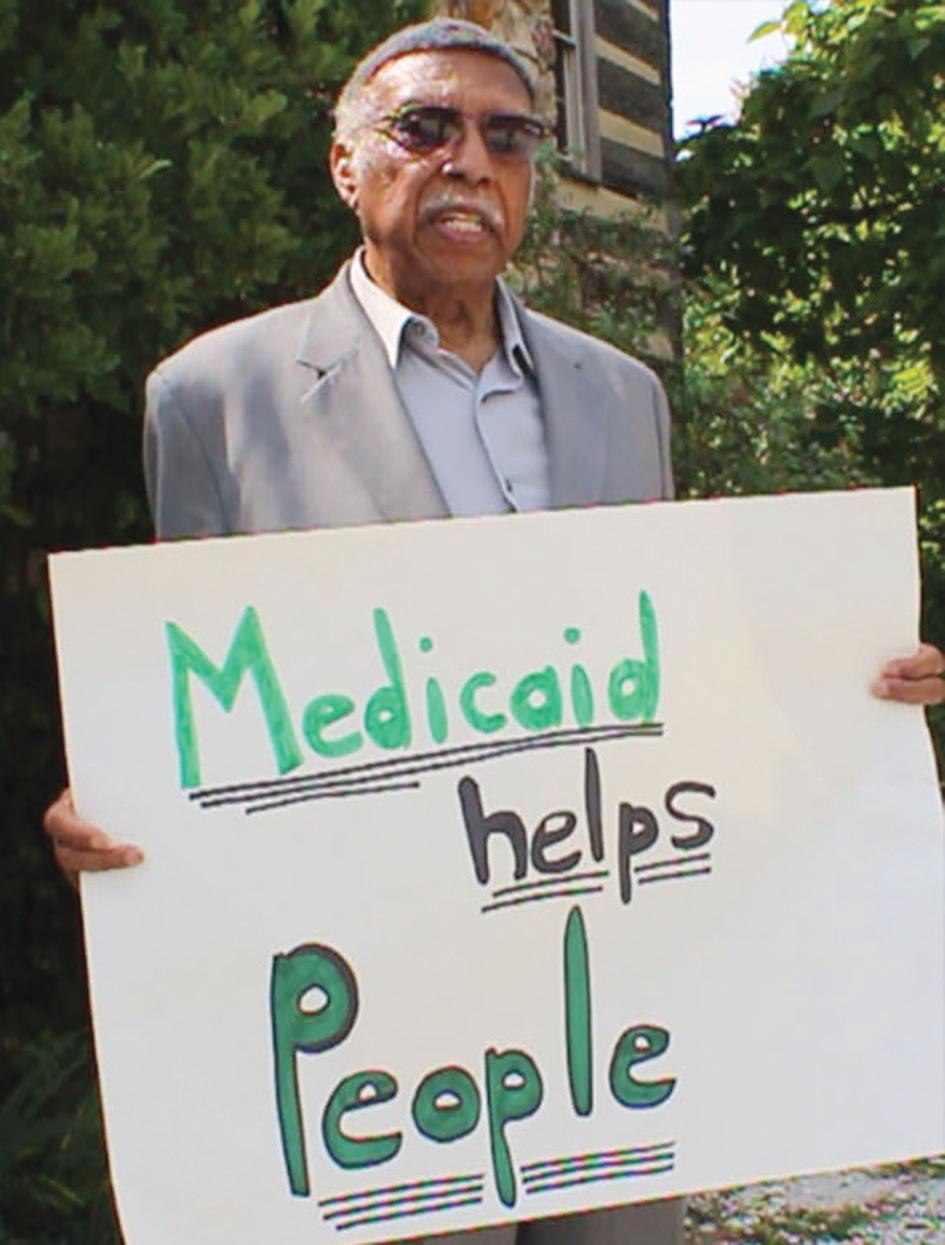
New Film ‘Godless’ Examines the Clash Between Catholicism and Politics


By Stacy M. Brown NNPA Newswire Senior National Correspondent
Actor Harry Lennix and director-writer Michael Ricigliano are bringing faith and politics to the forefront with their latest film, Godless. The film stars Ana Ortiz as Governor Angela Porra and Lennix as Bishop Reginald Rowland. It tells the story of a Catholic politician facing excommunication after signing progressive legislation into law.
“The film actually began as a play nearly six years ago,” Ricigliano said during an appearance with Lennix on the Black Press of America’s Let It Be Known. “It was originally in Latin, depicting a tribunal within the Church. As it evolved, the story shifted to focus on the excommunication of a Catholic politician for supporting progressive legislation, particularly a late-term abortion bill.”
Ricigliano explained that the bishop in the film is trying to prevent a politician from becoming the face of the Church while holding views that contradict its doctrine.
“As more power shifts back to the states, religion plays an even greater role in shaping political decisions,” he said.
Lennix, known for his roles in “The Five Heartbeats,” “Dollhouse,” and “The Blacklist,” brought his deep understanding of Catholicism to the role. A former seminarian, he shared that his personal background helped shape his portrayal of a bishop unwavering in his faith.
“I was once studying to be a Catholic priest, so I know a lot of priests and their mannerisms,” Lennix said. “The Church has been consistent in its stance on issues like the right to life, so it wasn’t difficult to find material to study.”
Lennix dismissed the idea of seeking political figures for inspiration, stating that his character’s convictions were clear-cut. “This character doesn’t care what other priests or even the Pope says—if you’re Catholic, you must adhere to its teachings,” he said.
Ricigliano pointed out that despite attempts to separate the two, faith has always played a significant role in politics. “You go back to King Henry VIII, the
Borgias—faith and politics have been linked for centuries,” Ricigliano noted.
“At its core, Godless is about forgiveness and understanding. It presents both sides of the debate—how a devout Catholic politician struggles to reconcile faith with duty and how a bishop takes a hardline stance to uphold Church teachings,” he stated.
Lennix agreed, adding, “Catholicism isn’t a pick-andchoose faith. If you don’t want to believe it, that’s fine, but don’t claim to be a good Catholic while contradicting its teachings.”
As discussions about the role of faith in governance intensify, Ricigliano noted how Godless mirrors realworld political pressures. He referenced President Donald Trump’s re-establishment of a faith council and doubling down on Christian values and how such actions further intertwine religion with policy.
“Politicians, particularly Catholic ones, must now answer directly to their constituents on faith-based issues,” he said. “With power shifting to state governments, voters are looking at where candidates stand on moral and religious issues.”
Beyond Godless, Lennix remains active in theater. He currently stars in Purpose, a new Broadway play directed by Phylicia Rashad. He sided with the stage when asked to choose between Broadway and film.
“Right now, it’s Broadway for me,” he said. “It demands a longer concentration span since you can’t redo scenes like in film. But overall, the distinction between stage and screen acting isn’t as pronounced as it once was.”
After a theatrical run in November, Godless will be available for streaming starting February 28 on Apple, Google Play, Fandango at Home, Amazon, and Vimeo. The filmmakers encourage audiences to follow @ GodlessMovie for updates.
“The title originally was Ipso Facto, meaning selfexcommunication,” Ricigliano said. “But we eventually landed on Godless, a title that better captures the essence of the film.”

Captain America: Brave New World
By Dwight Brown
the Steve Rogers version with Chris Evans, passed his Vibranium shield to the new Captain America, played by Anthony Mackie. It was an easy transition with some key differences. The former was white and a good dude. The new superhero is Black and a good dude—a man who is self-aware and cognizant of this opportunity for an African American. That’s the vision of Nigerian American writer/director Julius Onah (The Cloverfield Paradox). That’s the plan set forth by the socially conscious team of screenwriters: Rob Edwards, Malcolm Spellman, Dalan Musso, Peter Glanz and Onah. Introduce the movie going public to an Avengers warrior who is comfortable in his skin and able to express his point of view as he carries a legend forward: “If I’m not on point, I feel Iike I Iet down everyone else who is waiting for a seat at the table.” Sam Wilson, aka Captain America (Mackie), should have been a bit suspicious when friend/foe President
Thaddeus Ross (Harrison Ford) invited him to the White House for a gathering of international leaders. Yet there he was with his mentor Isaiah Bradley (Carl Lumbly, TV’s M.A.N.T.I.S.) and his mentee Joaquin Torres (Danny Ramirez, Top Gun Maverik). Security, as run by Ruth BatSeraph (Shira Haas, Unorthodox), was tight. Ross is being handled by Secret Service agent Leila Taylor (Xosha Roquemore, Precious). Prime Minister Ozaki of Japan (Takehiro Hira, Shõgun), Prime Minister Kapur of India (Harsh Nayyar, Men in Black) and the French President (Rick Espaillat, Dallas Buyer’s Club) are in attendance. The heads of state are ready to negotiate over a prime, coveted metal, adamantium. In what could have been a routine meeting, all hell breaks loose. Mayhem. Shooting, Accusations. Investigations. The very intriguing narrative heads in a multitude of directions. Action scenes pop up frequently enough to keep the most fidgety kid, tween and teen mesmerized. Onah directs all scenes with a verve that is consistent until the final credits. He gets great help with the footage’s rhythm from editors Madeleine Gavin and Matthew Schmidt (Avengers: Endgame) who clip scenes right where they need to be sliced.
Production design by Ramsey Avery (10 Cloverfield Lane) is sufficient but not extraordinary. Ditto on the cinematography (Kramer Morgenthau, Creed III). The costumes (Gersha Phillips, The Woman King) are a tad better than those elements. If all the visual aspects where at The Dark Knight level, and the stunt choreography was good as that in John Wick: Chpater4, but PG-13, this superhero movie would be great and not just good. Also, though Laura Karpman’s (American Fiction) musical score releases bursts of energy, there isn’t a playlist of chartstopping rap, rock or pop tunes that could further capture a young audience’s attention span. Fascinating, sci-fi trickery adds to the mix. Devious villains (Giancarlo Esposito, Breaking Bad; Tim Blake Nelson, Old Henry) keep the heroes guessing and looking over their shoulders. Plot piece by plot piece, the narrative builds and builds to two big crescendos. The first is dazzling with dual storylines converging until they hit a climax. The second is all too typical of a comic book hero movie. Strong performances abound. Ford, an octogenarian, still knows how to storm through a scene. Esposito and Nelson seethe with venom. Though Haas is petite, most won’t question her combat skills. In a very disarming way,
Lumbly is the feisty older uncle we all wish we had. His scenes with Mackie peak when the latter tries to save the former. Bradley: “Man, no escaping this time. I’m gonna die in here. You wanna help me?” Captain America: “Yes!” Bradley: “Don’t come back.” Mackie and Ramirez seem to share a charming, genuine brotherhood. An affability between the Captain and wannabe Falcon that adds depth. The younger Ramirez has the right amount of yearning, ambition and cockiness for twentysomething audiences. Mackie, always on the periphery in the Avengers movies, now heads his own film venture. His time waiting in the wings pass off. He’s come into his own, possesses leading man qualities and seems indestructible. Every scene he’s in, he owns. Using humor, sadness, anger and happiness he lets his emotions steal the spotlight. His version of Captain America is stalwart and in charge. Everything clicks. There’s enough excitement in this action/adventure movie to entertain the whole family, whether they’re Avengers diehards or novices. That’s because
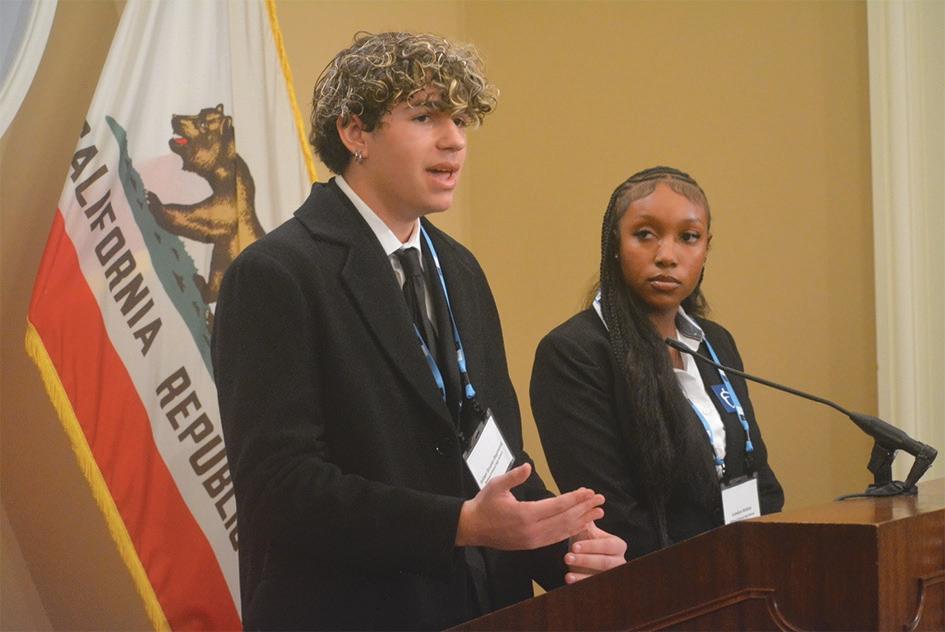
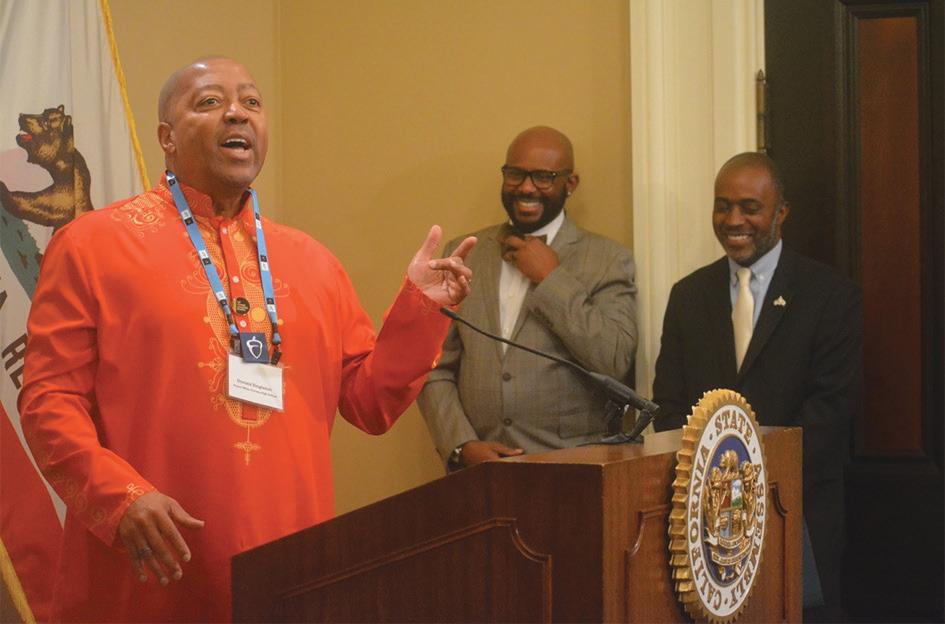
Black Lawmakers and Educators Highlight Importance of AP African American Studies
at the State Capitol to celebrate the progress of the Advanced Placement African American Studies program.
The AP African American Studies program is available to 117 schools across the state and is implemented in 42 states nationwide. It was launched nationally in the Fall of 2024 and over 500 colleges and universities now provide college credit for it.
Sen. Akilah Weber-Pierson, the chair of the CLBC, stated that Black lawmakers are “committed to expanding its reach” to all high schools in the state to ensure “every student has the opportunity to engage with African American history in a meaningful way.”
“We are thrilled to be able to celebrate the success and impact of the AP African American Studies course in California high schools,” stated Weber-Pierson. “The success of this course is a testament to the power of representation in education. We are committed”
A not-for-profit organization founded more than 120 years ago, the College Board reaches over seven million students a year, helping them navigate their journey from high school to college and into their professional careers.
AP African American Studies provides students with the opportunity to explore the history, culture, and
of African Americans and the larger African diaspora.
The special occasion at the State Capitol included AP students and educators who have taught AP courses in California since the program’s inception three years ago. It also combined an informational session about the program with a tribute to Black History Month.
A news conference was held to share the success of the program and talk about opportunities to expand access to the AP African American Studies’ course in more high schools in California.
State Superintendent of Public Instruction Tony Thurmond and Assemblymember Mike Gipson (D-Carson) shared their thoughts as a new ethnic studies requirement goes into effect this fall.
“We know that when people learn about themselves – we all do better,” Thurmond said at the gathering. “The other thing is that an inclusive education benefits everyone of all backgrounds.”
The AP Program is designed to academically prepare students to seek out college-level studies -- with the freedom to attain college credit, advanced placement, or both -- while attending high school.
Tony Green, an AP African American Studies instructor at Bishop O’Dowd High School in Oakland told California Black Media (CBM) that he and Susan Miller Dorsey High School teacher Donald Singleton have been teaching the course since the California pilot program
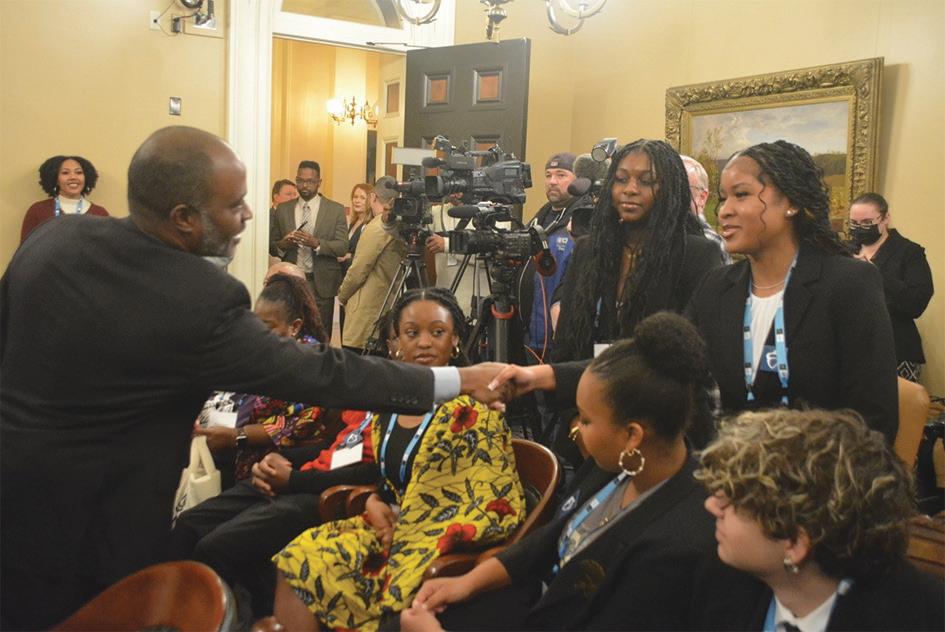
began in 2022 and have been College Board advocates for over three decades.
“We (Singleton and Green) are among the original 60 AP professors. I have 94 students in my AP class consisting of 11th and 12th grade students,” Green said. “We are in year four (of the AP African American Studies course) where I teach three classes.”
Through AP courses in 40 subjects, each culminating in a rigorous exam, students learn to think critically, construct solid arguments, and see many sides of an issue -- skills that prepare them for college and beyond.
“The benefits are profound,” Singleton said of AP courses and the AP African American Studies program. “It equips students with critical thinking skills by having them examine intersectionality, resistance, and resilience.”
Singleton continued by adding “Also, young people have to learn how to make choices by examining their past.”
The AP program began at the start of the 2022-2023 school year with 60 pilot schools across the country. It has now expanded to about 700 schools in the United States. The pilot students took the first AP African American Studies exam in the Spring of 2024.
The course will be available to all students in the United States in Spring 2025. According to College Board, over 200 colleges and universities have signed on to provide college credit.
“The introduction of the AP African American Studies class is a major step in strengthening and inclusion in our
community,” Gipson said. “This course provides students with a comprehensive understanding of African American culture, history, and contributions African Americans have made in our country and state of California.”
London Walker, a junior at Bishop O’Dowd High School in Oakland shared her experiences, explaining that the AP classes have been effective for her, presenting challenges to achieve success and providing a strong foundation in African American history. Walker, who calls herself “a law fanatic who watches Columbo,” is a lead closing attorney of Bishop O’Dowd’s Mock Trial Team. She aspires to be a criminal defense attorney and has already interned at the Alameda County District Attorney’s Office and the San Francisco Public Defender’s Office.
Through AP courses, Green said she and other students study cases that not only concern the United States Supreme Court but how they affect the people who disagree with the structure of the court system.
The AP African American Studies program is beneficial in the legal field because it encourages critical thinking. “It’s more than just a class,” Walker said.
“It’s important to know that AP African American Studies is not just an ethnic study class,” Walker said. “It’s a STEM (science, technology, engineering, math) class, history class, and music program. It’s about culture, about connection, and about making change.”
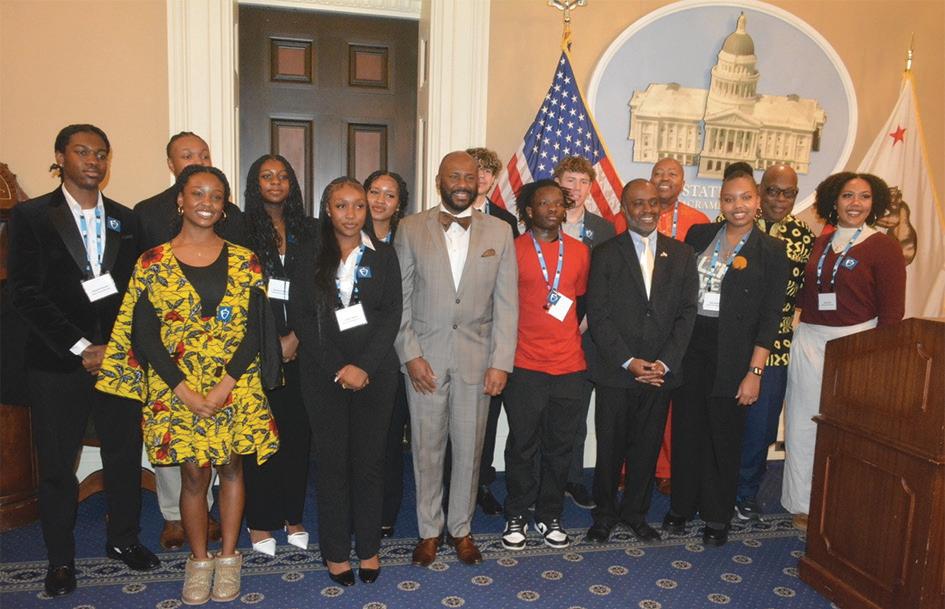
By Edward Henderson
The United States Centers for Disease Control and Prevention (CDC) recommends that “everyone 6 months or older get a flu shot — ideally by the end of October to boost protection against the disease during high-circulation winter months.
Dr. Scott Flinn, regional medical director for Provider Partnerships at Blue Shield of California, says people should be aware of flu symptoms and be able to recognize them.
“These symptoms can come on suddenly and hit hard,” says Flinn. “If you start feeling unwell, it’s important to rest and monitor your condition closely, especially if you are in a higher-risk group, including elderly individuals, pregnant women, young children, or those with chronic health conditions.”
the CDU-KEDREN Mobile Street Medicine program in Los Angeles. He explained why cases of the flu may be increasing and preventative measures people can take to protect themselves until the flu season ends next month. “Be fully vaccinated. It’s not too late to get the flu shot for this flu season. We stop giving it out about March every year,” said Abraham. “Be fully boosted with COVID-19 vaccines as well. This is a very tenuous time because people are not fully vaccinated,” he continued.
Typically, those symptoms include fever, chills, cough, sore throat, runny or stuffy nose, muscle or body aches, headaches, fatigue and, for some people – especially children – may experience vomiting and diarrhea.
Flu symptoms typically last five and to seven days, though fatigue and cough can persist for two weeks or longer in some cases.
If contracted, Flinn recommends getting plenty of rest, using over-the-counter meds, and taking steps to not spread the flu like staying home for 24-hours after avoiding close contact with others. He also advises that people fighting the flu should get plenty of rest; use over-thecounter medication; and consult a healthcare professional.
Abraham also recommends wearing masks when out in public if you are exhibiting flu symptoms. He also urges individuals who have insurance to schedule appointments with their primary physician as emergency rooms and urgent cares have become overcrowded.
While the cause of the spike in flu cases is still unknown, Abraham attributes some of the causation to changes in climate and rising temperatures across the state.
“That is why these bugs, these viruses, these bacteria
are
How Systemic Racism Harms Black Male Gun Violence Survivors Treated as Suspects, Not Patients
By Stacy M. Brown NNPA Newswire Senior National Correspondent
A disturbing new report reveals that Black men who survive gun violence are often treated as suspects rather than patients, exposing systemic racial biases in healthcare and law enforcement practices. The findings, compiled by Dr. Cherrell Green, a non-residential fellow at the Violence, Inequality, and Power Lab, examine the structural inequalities that shape how Black men experience trauma, recovery, and medical care.
Dr. Green, who serves as the Associate Director of Engagement and Assessment at the Everytown Community Safety Fund, discussed her research in an extensive interview the Black Press of America’s Let It Be Known News, explaining the long-term psychological and systemic harm inflicted on Black male survivors of violence.

“This was really born out of my dissertation that examined the experiences of Black men experiencing trauma and violence,” Dr. Green said. “Over the course of
40 interviews, what I consistently heard was the systemic racism that permeates every aspect of their lives, and violent injury due to guns was a main point of that.”
The report, Code Blue: How Police and Healthcare Providers Disrupt Healing for Violently Injured Black Men, is based on interviews with Black men across the United States who have sustained gunshot injuries. The study details how law enforcement’s presence in hospitals and the prejudices of medical staff contribute to further trauma and racialized harm.
One of the most egregious findings in the report is the extent to which law enforcement officers invade the privacy of Black male patients, treating them as perpetrators rather than victims. Dr. Green detailed instances where police officers entered hospital rooms without consent, questioned patients under duress and even took their fingerprints while they were sleeping or incapacitated.
“Imagine you’re laying in a hospital bed, trying to recover, and you have a police officer standing over you, assuming you’re the suspect,” she explained. “In some cases, they are even coercing medical staff into handing over patient records without authorization.”
This interference not only compromises the healing process but also fosters distrust between Black communities and healthcare providers. The report states that Black men are frequently denied the same level of care and empathy as other patients, with doctors and nurses often minimizing their pain or neglecting their psychological well-being.
Beyond physical recovery, the long-term psychological effects of this treatment are profound. Many of the men interviewed for the study described experiencing nightmares, flashbacks, and hypervigilance after being shot. Without adequate mental health support, they are left to navigate these traumas alone.
“I ask them, ‘What would you have wanted at the time?’ and every single man said, ‘I just wish I had someone to talk to,’” Dr. Green said. “They didn’t call it therapy, but they wanted someone to just listen.”
Dr. Green also recounted the experience of a 17-yearold who was shot multiple times, including in the head and chest, yet survived. He was driven to the hospital by a friend because the ambulance took too long to arrive. When they reached the hospital, police officers stopped them from entering and demanded to search the car for weapons while the young man was bleeding out. Eventually, he lost consciousness but was taken inside just in time for treatment. Incidents like this, she noted, illustrate how Black men seeking medical attention are often met with suspicion instead of care. “We get to hospitals looking for support, and we’re scrutinized and villainized. We are pathologized and dehumanized,” she said. “There are traumas coming from multiple directions. Black men are walking around here traumatized, not just from fatal injuries but from hearing gunshots and seeing someone shot; all of these things add up and fuel trauma. There’s

no access to care—physical, psychological, or mental. We need healthy communities where people are thriving, not just surviving.”
Dr. Green added that many survivors return to the same communities where they were shot, sometimes encountering the very individuals responsible for their injuries. With no formal support system in place, these men are often forced to rely on self-protective measures, which can perpetuate cycles of violence.
The Code Blue report recommends establishing clear protocols for police behavior in hospitals to prevent unauthorized interrogations and record-seizing. Expanding hospital violence intervention programs to integrate medical professionals with lived experience in community violence is also among the proposed solutions. Investing in culturally competent mental health care tailored to Black male survivors is another critical step. Community-based trauma centers providing alternatives to hospitals for those who distrust the medical system are necessary to address
the systemic failures that have left so many without proper care.
“Oftentimes, the doctors came in, patched them up, and didn’t even ask how they were doing,” Dr. Green said. “That lack of care reinforces the dehumanization of Black men in medical settings.”
The findings of Code Blue reflect the structural barriers that Black men face in law enforcement and healthcare, Dr. Green asserted further. She said the consequences extend beyond individual patients, affecting entire communities as untreated trauma fuels cycles of violence and distrust. Addressing these disparities requires immediate policy changes and a shift in how institutions perceive and treat Black male survivors of violence.
“We must recognize that those most harmed by violence are most deserving of support,” she concluded. “Only by acknowledging these systemic failures can we begin to create pathways to real healing and justice.”

From the Classroom to the Living Room:
Three Ways Families Can Help Children Build Early Literacy Skills
tools with their unique students. I’ve also seen, in my work and as the parent of a young reader, the importance of building a strong home-school connection. In a recent survey, 91% of early childhood educators underscored the importance of parent/caregiver engagement for developing early literacy skills in young students. This echoes a wide body of research that shows the positive links between involved families and student achievement. So, how can families help young children build a strong foundation for reading and writing? Here are some suggestions that are both fun and free. Read. It seems like an obvious suggestion, but the power of reading — as families and independently — cannot be overstated. Research shows the number of different types of literacy materials in the home, the amount of home reading, and the opportunity to discuss reading are all related to reading proficiency. Families can start their literacy journey together by taking a trip to the public library together. At the library, children can engage in storytime events and explore the stacks for books and magazines that catch their attention. Adults, too, should pick titles they are interested in reading independently, as modeling good reading habits is also beneficial. Back at home, families are encouraged to set aside time each day to read together. Families can make storytime more engaging for children by pausing
throughout the story to ask questions about the plot or about how certain themes in the story make their child feel; using different voices for the different characters; or even acting out the story with toys. Incorporate literacy skills into everyday activities. Families don’t have to spend a lot of money on activities or programs to help their children on their journey to literacy. There are many ways to incorporate reading and writing skills into everyday life that are both free and fun. Try, for example, simply making a list. Lists are an easy way to get your child to write. Consider: Making a grocery list. Ask your child about their favorite meal or treat and work together to write down all of the ingredients you’ll need to make it. For younger children, you can read your grocery list aloud, playfully emphasizing the letter sounds and showing them the ingredients at the market to keep them engaged. Writing the steps of an everyday chore. Invite your child to write and illustrate the steps in an everyday chore, like doing laundry. Then use that list for your child’s future reference.
Taking an order. Role play you are dining in a restaurant, and encourage your child to write down your order. At the end of the day, ask specific questions. It can be difficult for young children to remember
what they did during the day so asking, “What did
Black Caucus and Black Chamber Host Black History Event Recognizing Businesses
By Antonio Ray Harvey
In celebration of Black History Month, the California Legislative Black Caucus (CLBC) and the California Black Chamber of Commerce (CBCC) recognized 16 honorees at the annual Black Business Brunch on Feb. 10 at the Citizen Hotel in Sacramento.
The small business owners from every corner of the state were recognized for their entrepreneurship, contributions to their respective communities, and vital roles in improving California’s economic landscape.
The proprietors were chosen by members of the CLBC and CBCC. They were honored on the Assembly floor at the State Capitol later that afternoon.
“We gather here today to honor the incredible African American, small business owners of California,” Jay King, President and CEO of CBCC, told California Black Media. “We have to show them some love because they are the heart and soul of our communities. Their tireless work and unwavering dedication show what it means to be leaders”
CLBC members Sen. Laura Richardson (D-Los Angeles), Sen. Lola Smallwood-Cuevas (D-Los Angeles), Assemblymember Tina McKinnor (D-Inglewood), Assemblymember Corey Jackson (D-Moreno Valley), and Assemblymember Rhodesia Ransom (D-Stockton) presented awards to respective honorees.
Assemblymembers Lori D. Wilson (D-Suisun City), LaShae Sharp-Collins (D-San Diego), and Mia Bonta (D-Alameda) also paid homage to Black business leaders.
CLBC chair Sen. Akilah Weber (D-San Diego) was unable to attend due to a prior commitment. CLBC Vice Chair Isaac Bryan (D-Ladera Heights) spoke on her behalf.
“While we recognize you today, you are recognized in your communities every single day,” Bryan told the honorees.
“We need you and we rely on you. You were not just picked at random (to receive this award).”

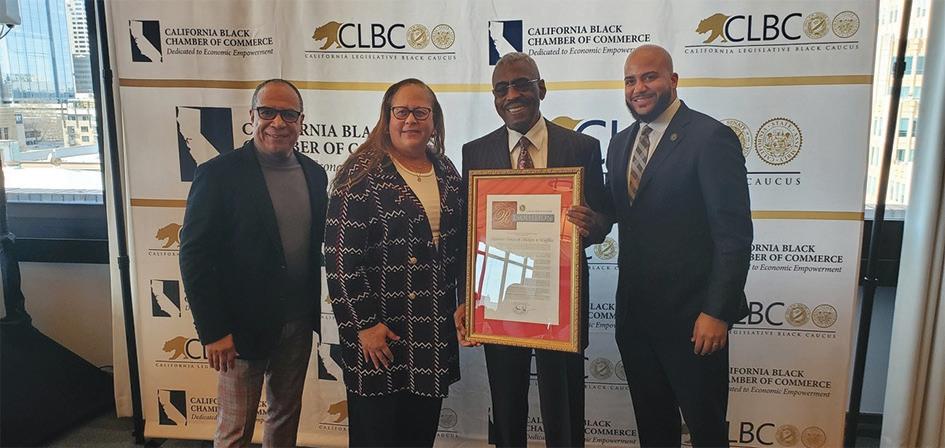
Featured speakers at the brunch were California Secretary of Transportation Toks Omishakin and California State Treasurer Fiona Ma. Tara Lynn Gray, Director of the California Office of the Small Business Advocate (CalOSBA), was also present at the annual brunch.
Omishakin’s message was brief, highlighting ways the state helps support Black small businesses. The Department of Transportation’s (Caltrans) allocates substantial amounts each year to finance construction projects started by state and local governments, public transit agencies and airport authorities.
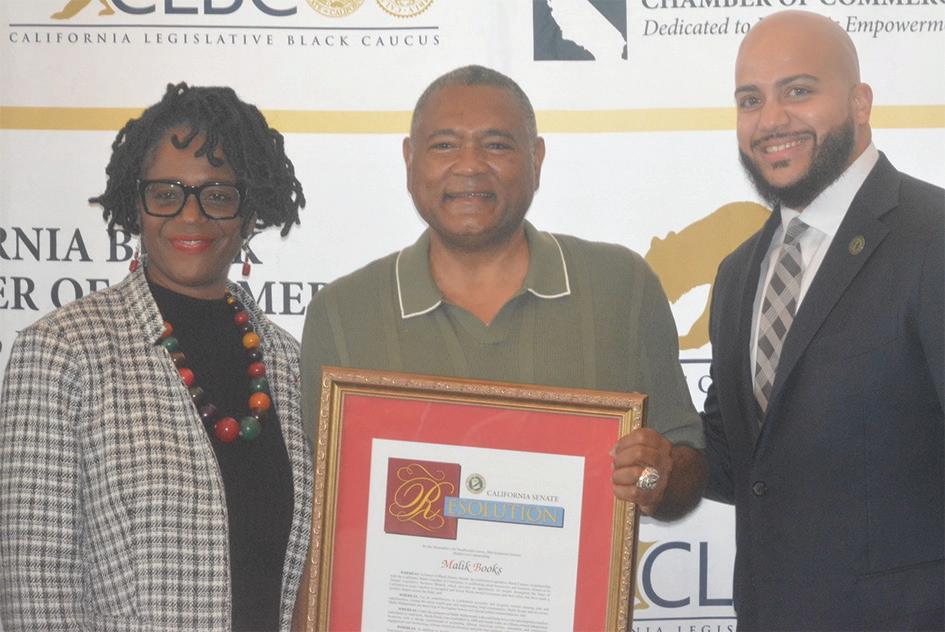

Caltrans ensures that firms competing for stateassisted contracts for these projects are not disadvantaged by unlawful discrimination. In fiscal year 2022-2023, nearly $1 billion was awarded to small businesses in the state. African American small businesses received about $40 million, leaving “money on the table,” Omishakin said.
“That’s hundreds of millions of dollars,” Omishakin said about possible procurement opportunities for Black businesses. “There’s a lot of work still to do, with Caltrans and other places, to make sure that African American and Latino owned firms get more opportunities to get that work.”
Omshakin said Caltrans’s most important tool for meeting its commitment to inclusion of minority-owned businesses has been its Disadvantaged Business Enterprises (DBE) program. Small businesses must be DBE-certified to receive state funding.
CLBC member, Assemblymember Mike Gipson (D-Carson), was presented with the Chairman’s Award for his significant leadership in fostering economic empowerment and his dedication to his constituents in the 65th Assembly District.
The Legacy and Literacy Leadership Award was bestowed upon Georgia “Mother Rose” Peat West, the founder and owner of Underground Books in Sacramento. West passed away in December. Her son, Ronnie West, accepted the award on her behalf.
The year’s business honorees were Nelson German (alaMar Kitchen and Bar); Jonathan Kinnard (Coffee del Mondo); Brad Cooper (Coop’s West BBQ); Victor Headley (Every Little Thing Jamaican); Eugene Bennett (Grocery Outlet Bargain Market); Marques McCammon (Karma Automotive); Joseph Cannon (KJ’s Barber and Hair Creationz); and Jauneice Munoz (La Casa Azul Design).
Rounding out the awardees were Malik Muhammad (Malik Books); Aimbrell Shanks (Partytime Machine Rentals), John Cleveland (Post and Beam); Mark Jenkins (Preferred Cremation); Herb Hudson (Roscoe’s Chicken and Waffles); Dennis Peterson (That Guy Eye Wear); Eric Calvin (Ultra Unlimited); and Kedrin Johnson (WAYS Home Care and Health Agency).
“Small businesses are the backbone of our economy,” King said. “Your role within this large framework cannot
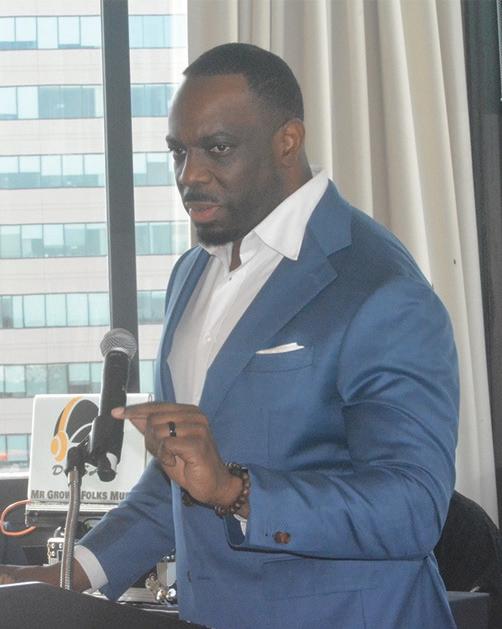
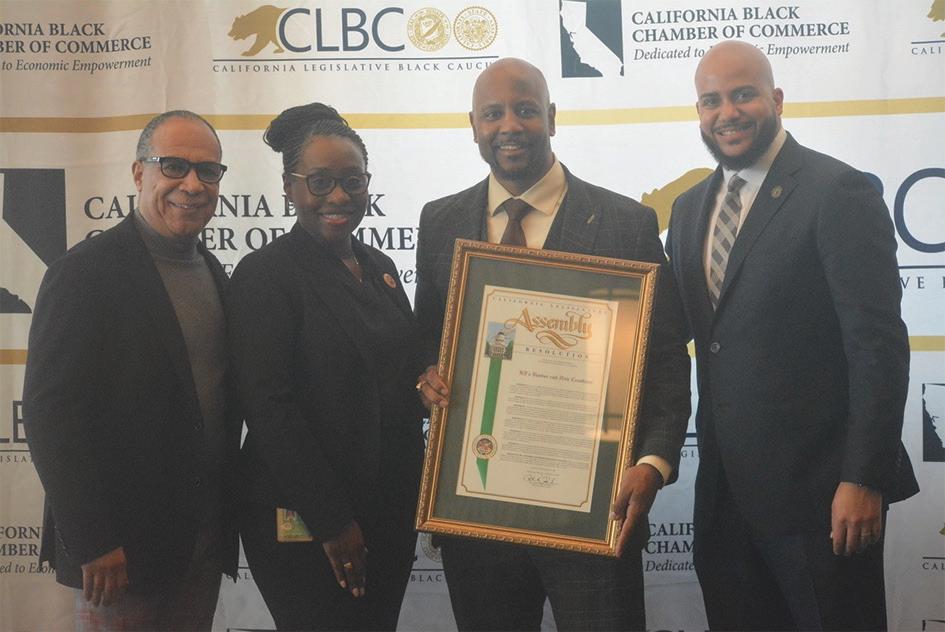
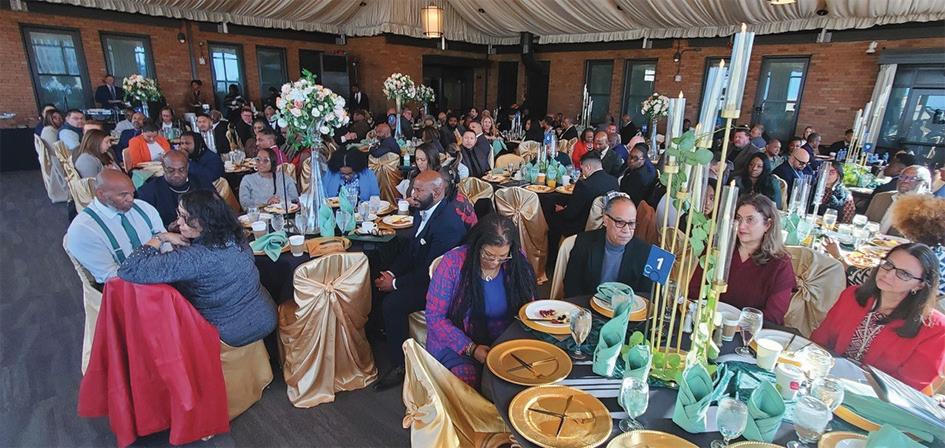
California Capitol News You Might Have Missed Political Playback
By Bo Tefu California Black Media
Gov. Newsom Visits Altadena; Kicks Off Next Phase of Recovery Effort
Gov. Gavin Newsom joined federal and local leaders to launch a new phase of firestorm debris removal in Southern California last week, marking the fastest large-scale cleanup effort in modern state history.
The operation began just 35 days after the wildfires that destroyed parts of Los Angeles County ignited -- about half the time it took to start similar efforts after the 2018 Woolsey Fire.
The Federal Emergency Management Agency (FEMA) and the U.S. Army Corps of Engineers (USACE) began debris removal Tuesday in Altadena and the Pacific Palisades. This follows the U.S. Environmental Protection Agency’s (EPA) initial removal of household hazardous waste, a crucial first step in wildfire recovery.
“This new phase of debris removal marks a foundational step in helping Angelenos build back stronger,” said Newsom, thanking state and federal workers for expediting the cleanup.
Under Newsom’s leadership, California has cut red tape and streamlined the recovery process. The Los Angeles County Department of Public Works, in partnership with six local jurisdictions, has been collecting Right-of-Entry forms, developing haul routes, and coordinating the safe transportation of fire debris.
The EPA has been working at record speed to clear hazardous materials, allowing structural debris removal to move forward. As crews increase their presence in affected communities, officials urge residents to remain patient as work continues.
Legislative Republicans Push Back on State’s Plan to Charge Insurers $1 Billion for Wildfires
Assembly Republican Leader James Gallagher (R-Yuba City) and Assemblymember David Tangipa (R-Fresno) are opposing recent changes to California’s FAIR Plan, which could result in higher insurance costs for homeowners.
The FAIR Plan is a state resource that provides basic fire coverage to homeowners when it is not available from traditional insurers.
Insurance Commissioner Ricardo Lara recently approved a plan allowing the FAIR Plan to seek $1 billion from insurance companies to cover growing wildfire-related claims. Up to 50% of these costs could be passed on to policyholders.
Gallagher criticized the move, arguing that the focus should be on wildfire prevention rather than increasing costs for homeowners.
“Forcing working families to pay for the failures of California’s insurance market is not a real solution,” said Gallagher. “The real fix starts with reducing wildfire risk -- clearing excess fuel, improving forest management, and hardening homes.”
Tangipa echoed similar concerns about the surcharge.
“This is just another Band-Aid to a broken system,” he said.
He emphasized the need for risk mitigation efforts, including vegetation management and streamlining regulations that prevent effective safety measures.
With insurance providers withdrawing from the California market due to wildfire risks, the FAIR Plan has become an increasingly critical option for homeowners.

New Report Highlights Wage Gap for Black Women in California
A new report, Disrupting Disparities: Ending the Black Women Wage Gap in California, reveals that Black women, particularly single mothers, continue to face significant wage disparities, earning far less than White men in the state. At the current rate, the report highlights that California’s Black women wage gap will take 100 years to close.
The report found that in 2022 Black women earned an average of $54,000 annually, while Black single mothers earned $50,000 compared to $90,000 for White men. When factoring in total income, Black women earned $60,000, while single mothers earned $53,000, still well below their White male counterparts. This means Black women earn just $0.60 for every $1 a White man makes, with single mothers making only $0.56.
The financial impact extends beyond paychecks, affecting access to housing, childcare, and basic necessities. If paid equitably, the report states, a Black single mother in California could afford an extra year of rent or two years of childcare.
To address these disparities, the report recommends expanding pay transparency laws, increasing access to affordable childcare, investing in workforce development programs, and implementing region-specific minimum wage increases. It also calls for enhanced workplace protections, leadership development initiatives, and a statewide task force to focus on Black women’s economic equity.
Advocates argue that closing the wage gap is critical not only for Black women and their families but also for strengthening California’s economy.
State Senate Introduces Major Wildfire Package
Senate President pro Tempore Mike McGuire (D-Healdsburg) and a coalition of California Senators have unveiled the Golden State Commitment, a sweeping legislative package designed to strengthen California’s wildfire response and improve recovery efforts.
The package addresses wildfire prevention, recovery, and insurance issues, aiming to make communities safer from future wildfires.
Following the recent firestorms in Los Angeles County, the Senate has introduced 13 bills aimed at accelerating wildfire recovery and enhancing fire resilience statewide. Key measures include speeding up residential rebuilds, providing property tax relief, protecting consumers from price gouging, and expanding insurance protections for homeowners, tenants, and small businesses. The plan also includes support for rebuilding health facilities and school districts affected by wildfires.
In addition to recovery efforts, the Golden State Commitment focuses on long-term fire prevention. Notable provisions include transitioning 3,000 CAL FIRE seasonal workers to permanent positions, establishing a community hardening insurance commission and implementing stricter fire-safety regulations for landscaping and construction in high-risk areas.
McGuire emphasized the urgency of addressing the yearround fire season.
“These bills are essential to helping communities stabilize in the aftermath of a wildfire and ensuring California is more fireready and resilient for decades to come,” said McGuire.
criminal penalties for looting and ensuring defensible space around properties.
Could FCC DEI Investigation of Comcast Spell Trouble for Other Companies?
Several California companies, including Apple, Cisco, Trader Joe’s, have expressed their commitment to Diversity, Equity and Inclusion (DEI) amid concerted efforts to eliminate those programs in the public and private sectors. But last week, the Federal Communications Commission (FCC) launched an inquiry into Comcast Corp’s DEI initiatives, marking the first such probe into a major media company. The move comes as FCC Chairman Brendan Carr intensifies efforts to dismantle DEI programs that he claims may violate equal employment laws.
Comcast, a Philadelphia-based cable and media giant, confirmed its cooperation with the FCC’s inquiry. The probe is part of Carr’s broader effort to scrutinize workplace incentives in companies regulated by the FCC. In a letter to Comcast Chairman Brian Roberts, Carr emphasized his goal of ensuring that companies do not engage in discriminatory practices under the guise of DEI initiatives. He cited the Communications Act and FCC rules, which prohibit employment discrimination based on race, gender, religion, or national origin. Carr, recently appointed by President Donald Trump, argued that the new administration is, “leading America away from the scourge of invidious DEI discrimination and ensuring that everyone in this country has a fair shot at succeeding.”
Since taking office, Carr has prioritized eliminating DEI policies within government agencies and businesses. The FCC’s influence over Comcast is significant, as the company relies on FCC licenses for its cable, internet, and broadcast operations. The inquiry comes amid broader shifts in corporate DEI policies. This week, Walt Disney Co. confirmed changes to its DEI approach, including removing diversity-related factors from executive compensation.
Comcast has long promoted its commitment to diversity, stating that an inclusive workforce enhances innovation and success. Following George Floyd’s 2020 murder, NBCUniversal executive Cesar Conde set a goal for a 50% nonwhite workforce at NBC News.
In a statement, Comcast acknowledged the inquiry and confirmed that the company is willing to cooperate with the FCC.
“For decades, our company has been built on a foundation of integrity and respect for all of our employees and customers,” Comcast stated, defending its company practices. The FCC’s investigation also coincides with Trump’s ongoing conflicts with major media networks. Trump has accused broadcasters like NBC and CBS of bias and has pushed for FCC actions against them. His $20 billion lawsuit against CBS is currently entangled in Paramount Global’s potential merger with Skydance Media, a deal that requires FCC approval.
American Heart Association Partners
with the Black Press for Groundbreaking Black Health Symposium
By Stacy M. Brown
NNPA Newswire Senior National Correspondent
For the first time, a major corporation has chosen to broadcast a significant health initiative exclusively through the Black Press of America. The American Heart Association (AHA) partnered with the National Newspaper Publishers Association (NNPA) to present “Changing the Future of Health for Black Communities: Public Health and Media Symposium,” a virtual event streamed live on NNPA’s YouTube channel as part of Black History Month. The NNPA is the trade association representing the more than 200 African-American-owned newspapers and media companies in the United States, which only known as are commonly known as the Black Press of America. Initially planned as a hybrid event in Washington, D.C., the symposium transitioned to a fully virtual format due to inclement weather. The event brought together leaders in healthcare and media, emphasizing the critical need for collaboration in addressing health disparities impacting Black Americans. The panel featured distinguished health professionals, including Dr. Regina Benjamin, the 18th U.S. Surgeon General and founder of the Bayou Clinic; Dr. Keith Churchwell, president of the American Heart Association; and Katrina McGhee, AHA’s chief marketing officer. Media figures included Sharí Nycole, co-host at Reach Media; Dr. Benjamin Chavis Jr., NNPA president and CEO; and April Ryan, senior White House correspondent and Washington Bureau Chief for BlackPressUSA.com. Sybil Wilkes, the veteran journalist known for her role on The Tom Joyner Morning Show, moderated the discussion. Black Health in Crisis
Dr. Churchwell laid out stark statistics highlighting the disproportionate impact of cardiovascular disease on Black Americans. “Cardiovascular disease remains the leading cause of death in the Black community,” Churchwell said. “Between 2017 and 2020, nearly 59 percent of Black men and women over the age of 20 had some form of cardiovascular disease, including coronary disease, stroke, and hypertension. In 2022 alone, almost 65,000 Black men and 59,000 Black women died from cardiovascular disease.” Hypertension remains one of the most prevalent health concerns. “The incidence of hypertension in the general population is 47 percent, but among Black men, it’s 57 percent, and among Black women, it’s 58 percent,”
Churchwell said. “That’s the leading risk factor for heart disease and stroke.”
Dr. Benjamin emphasized that addressing these health disparities requires more than just medical intervention.
“We’ve learned that to truly reduce and ultimately eliminate health disparities, we must address social determinants of health, such as poverty, education, and access to care,” Benjamin said. “Studies show that poverty and dropout rates are as important a health risk factor as smoking.” She stressed the necessity of prevention, adding, “Quality health outcomes depend on access to the right information, tools, and technology. But it also depends on communication—our patients understanding us, and us understanding them.”
Media’s Role in Shaping Black Health Outcomes
NNPA President Dr. Chavis underscored the Black Press’ role in disseminating accurate health information and combating misinformation. “We must recognize that Black media has the power to inform, educate, and sustain critical messaging about health,” Chavis said. “One-shot messaging doesn’t work. We must repeat these messages consistently to keep them in the consciousness of our community.” April Ryan pointed out how urgent the matter is in Black communities. “We are still the community with the highest number of negative health outcomes in almost every category,” Ryan said. “We need to continue this conversation beyond today. This isn’t about a news cycle— it’s about life and death.”
Sharí Nycole stressed that the media must inform and lead by example. “We can’t just tell people what to do— we have to model it,” Nycole said. “We need to be visible examples of prioritizing our health, whether through social media, community events, or personal engagement.”
CPR: Creating a “Nation of Lifesavers”
The symposium spotlighted the AHA’s Nation of Lifesavers campaign to ensure more Black families are equipped with CPR knowledge. The initiative gained national attention following Buffalo Bills player Damar Hamlin’s on-field cardiac arrest, which immediate CPR mitigated. “Nearly three out of four cardiac arrests that happen outside a hospital occur in the home,” McGhee said. “This means the life you save is likely someone you love. Yet Black people are the least likely to receive bystander CPR. That must change.” Churchwell pointed
to a recent AHA study revealing that while bystander CPR rates have improved nationwide, Black women are the least likely to receive immediate CPR assistance. “This presents a massive opportunity for intervention,” Churchwell said.
“More people need to be trained, and we need to break down whatever barriers are preventing Black women from receiving life-saving care when they need it most.”
A Call to Action Chavis announced that the NNPA will make Black health a top editorial priority and extend coverage beyond Black History Month. “We cannot afford to lose a single day without focusing on healthcare,” Chavis said. “Health is not just an issue for February. It’s an issue for all 12 months, every single year.” Ryan asserted that it’s crucial to make health a communal effort. “We have to hold each other accountable,” she said. “Host CPR nights with your girlfriends, bring healthcare conversations to the barbershop, get cholesterol checks at your church health fair. These small changes can save lives.” McGhee also urged action. “We need to move from awareness to action,” she said. “One person in every household should know CPR. If you don’t, today is the day to start. Visit heart.org/nation to learn more.”

Healing in the Soil: Honoring Black History and a Cleaner Future for California
the soil. Digging my hands into the earth and spending hours in my garden wasn’t just a distraction—it became a path to healing.

As we celebrate Black History Month, I reflect on how gardening has long been a tool of resilience in Black communities. From the Victory Gardens of the 1940s to today’s urban farming movements, gardening represents survival, growth, and self- determination.
This connection inspired Meet Me in the Dirt, not just as a business but as a sanctuary where healing happens naturally. Through gardening, grounding, and mindfulness, I’ve reconnected with myself and witnessed how these practices nurture others in my community. I was inspired to learn how the mission of Meet Me in the Dirt aligns with Caltrans’ Clean California initiative, which aims to restore and beautify shared spaces by transforming areas plagued by litter into places of pride and healing. Litter affects us all, turning public spaces into sites of neglect and harm. Clean California works to break this cycle by removing litter, creating jobs, and educating communities—empowering everyone to help keep our state clean.
This Black History Month, I encourage my community to honor the legacy of resilience and stewardship in Black communities by protecting and beautifying the spaces we call home. Here are three simple ways to connect with nature, improve your environment, and make a difference: Start Small: Plant a houseplant or begin a garden bed. Tending to something living fosters patience and presence. Clean Up and Ground Down: Pick up litter in your neighborhood, then take a moment to ground yourself—stand barefoot on grass or soil to calm your mind. Reflect and Plan: Keep a journal to track your thoughts while outdoors. Write one small step you can take to beautify your surroundings. Change starts with each of us. Together, we can transform parks, lots, and roadsides into spaces of beauty, community, and restoration, as the Clean California initiative reminds us. Visit CleanCA.com to learn more, and for more about Meet Me in the Dirt, visit Meetmeinthedirt.com.

Corporate America Abandons DE&I, But Black-Owned Brands Are the Future
By Stacy M. Brown
NNPA Newswire Senior National Correspondent
While corporations retreat, Black entrepreneurs continue to build, innovate, and thrive. According to NBC Select, over three million Black-owned brands are in the U.S., spanning every industry imaginable. As corporate America abandons its DE&I commitments, the power shifts to conscious consumers who invest in businesses that
uplift and sustain marginalized communities. Here are just a few standout Black-owned brands leading the charge: Clothing & Accessories Telfar – The brand that revolutionized luxury fashion with its motto: “Not for you—for everyone.” Hanifa – A trailblazing womenswear brand founded by Anifa Mvuemba, known for its stunning digital fashion shows.

Pyer Moss – Founded by Kerby Jean-Raymond, this label merges activism and high fashion.
Grayscale – A streetwear brand bringing bold aesthetics and social commentary to the forefront.
Sassy Jones – A standout accessories brand built on bold, unapologetic self-expression.
Beauty & Skincare
Fenty Beauty – Rihanna’s globally inclusive beauty empire that set a new standard for shade diversity.
Mented Cosmetics – Beauty products created specifically for deeper skin tones.
The Lip Bar – A Black-woman-owned brand disrupting the beauty industry with bold, non-toxic lipstick shades.
Pattern Beauty – Founded by Tracee Ellis Ross, specializing in products for textured hair.
Alikay Naturals – Natural haircare products with a devoted following.
Home & Lifestyle
Estelle Colored Glass – Hand-blown glassware that brings Black excellence to fine dining.
Jungalow – A home décor brand from designer Justina Blakeney, blending culture and bohemian flair.
Linoto – Luxury linen bedding made with sustainability in mind.
Yowie – A modern design studio curating unique home goods from independent artists.
Food & Beverage
Partake Foods – A Black-owned snack company offering allergen-friendly cookies and treats.
McBride Sisters Wine Collection – The largest Blackowned wine company in the U.S., run by two sisters redefining the industry.
Uncle Nearest Whiskey – Honoring Nathan “Nearest” Green, the Black distiller behind Jack Daniel’s original recipe.
Capital City Mambo Sauce – The D.C. favorite taking over the condiment industry.
Meanwhile, corporate America’s performative commitment to diversity, equity, and inclusion (DE&I) is unraveling at an alarming rate. In the years following the murder of George Floyd, corporations made bold promises to support marginalized communities, pledging billions in investments to level the playing field. But as the political landscape shifts and accountability wanes, those commitments are being discarded. A staggering number of major corporations have scaled back or eliminated DE&I programs: Amazon, Target, Amtrak, Goldman Sachs, Disney, Deloitte, PBS, Google, Pepsi, General Motors (GM), GE, Intel, PayPal, Chipotle, Comcast, Accenture, The Smithsonian Institution, the FBI, Meta, Walmart, Boeing, Molson Coors, Ford Motor Co., Harley-Davidson, and John Deere have all abandoned or severely reduced their diversity efforts. The very companies that once paraded their commitment to racial equity in multimillion-dollar ad campaigns are now quietly erasing those initiatives from their bottom lines.
Not everyone is staying silent. Dr. Jamal Bryant, the influential pastor of New Birth Missionary Baptist Church in metro Atlanta, is leading a 40-day economic fast—or boycott—of Target in direct response to the retailer’s decision to phase out its DE&I initiatives. Target, headquartered in Minneapolis—the city where George Floyd was murdered in 2020—originally pledged $2 billion in investments toward Black-owned businesses. That commitment was due in December 2025, but on January 24, Target announced it would end its DE&I efforts, effectively abandoning that financial commitment.
Bryant, appearing on the Black Press’ Let It Be Known news program, condemned the move. “After the murder of George Floyd, they made a $2 billion commitment to invest in Black businesses,” he said. “When they pulled out of the DE&I agreement in January, they also canceled that $2 billion commitment.”Target is just the beginning. Bryant calls for 100,000 people to halt their spending at the retail giant as a direct challenge to corporate America’s retreat from racial equity. “Black people spend $12 million a day at Target,” he said. “Because of how many dollars are spent there and the absence of commitment to our community, we are focusing on Target first.” The boycott, designed to coincide with Lent, aims to leverage Black economic power to hold corporations accountable. Within just one week, 50,000 people had already signed the petition at targetfast. org, signaling the growing momentum behind the movement.Bryant’s demands go beyond reinstating DE&I. “White women are the number one beneficiary of DE&I,” he noted. “What I am asking for is a quarter of a billion dollars to be invested in Black banks so that our Black businesses can scale.” He also called for Target to partner with HBCUs by integrating their business departments into its supply chain infrastructure. Meanwhile, the National Newspaper Publishers Association (NNPA)—the nation’s largest Black-owned media organization—has announced its own national public education and selective buying campaign in response to corporate America’s retreat from DE&I.
“We are the trusted voice of Black America, and we will not be silent or nonresponsive to the rapid rise of renewed Jim Crow racist policies in corporate America,” said NNPA Chairman Bobby R. Henry Sr.NNPA President and CEO Dr. Benjamin F. Chavis Jr. reinforced the need for financial realignment. “Black Americans spend $2 trillion annually. We must evaluate and realign to question why we continue to spend our money with companies that do not respect us. These contradictions will not go unchallenged.” In response, Bryant has partnered with Ron Busby, president and CEO of the U.S. Black Chambers, to provide consumers with a directory of 300,000 Blackowned businesses. “You can’t tell people what not to do without showing them what to do,” Bryant said. “If you’re not going to Target or Walmart but need essentials like toilet paper, soap, or detergent, we’ll show you where to get them and reinvest in Black businesses.”And the impact of the boycott is already felt. Since Black consumers began boycotting Target, the company’s stock has dropped by $11, Bryant noted. Stockholders are now suing Target due to the adverse effects of the boycott on its stock value. Bryant said the question is no longer whether corporate America will keep its promises—it’s clear that it won’t. He said the same companies that plastered Black squares on social media and made grand statements about inclusion are now proving where their true priorities lie. “America has shown us time and time again: if it doesn’t make dollars, it doesn’t make sense,” Bryant stated.
